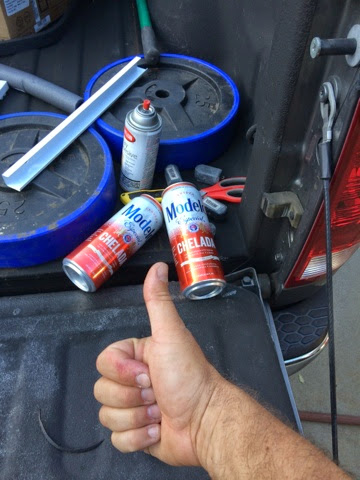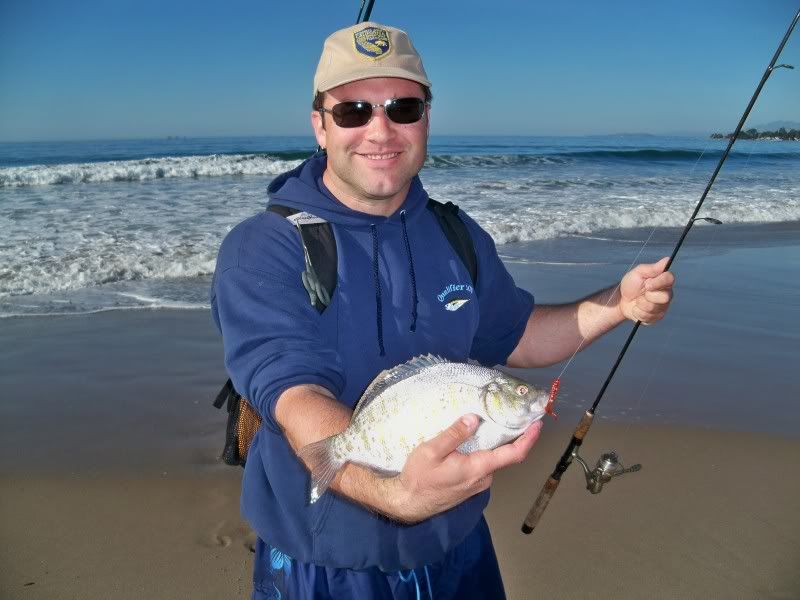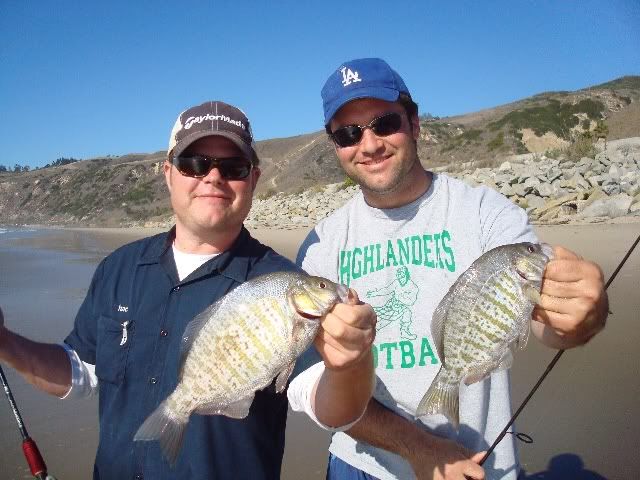And so it was, that on January 16, 2011, my wife Brandy and I were enjoying a quiet meal of In N Out in our diminutive living room, perhaps one of the last meals we would enjoy in that house together. Each room was half-packed in boxes, the other half strewn about in the kind of clutter that only comes with moving. Simply put, our house had grown too small, our mortgage had grown too big. The combination was the death knell for our credit, maybe, but with a lease already signed for a larger house in a much nicer area...and at half the monthly rate for a "you're not going to see a dime of equity for fifteen years anyway" sort of place, it was a done deal.
More importantly, there were soon to be more mouths to feed. Three more mouths, to be exact.
For the moment, though, my wife and I focused our feeding efforts on ourselves. The unmistakable smell of In N Out grilled onions, piled high on my animal-style cheeseburger, filled the air. Paired with a chocolate shake and fries, it was comfort food. For my beloved Brandy, 19 weeks pregnant with triplets and anything but comfortable, her In N Out grilled cheese with raw onion gave her a brief respite from what had been a very rocky 5 months of pregnancy. Satisfied for the moment, she lay down on the couch, closed her eyes, and fell asleep, the smell of burgers still hanging in the air like some exotic, edible perfume.
Modern science explains that there is an inexorable link between smell, taste, and long term memory. A 2009 study at the Weizmann Institute in Israel suggests that the olfactory cortex (unlike other sensory processing centers of the brain) is directly connected to the hippocampus, where long-term memories are born. Less empirical evidence demonstrates in all of our lives that we associate smells and tastes with memories and emotions: my third grade teacher's hand lotion as she walked by my desk distributing spelling tests, diesel exhaust mixing with the fishy brine of an anchovy-filled bait tank on a sportfishing boat; the chew and flavor of saltwater taffy purchased in Avalon, popped into the mouth with fingers marinated in the coconut and pina colada scent of Hawaiian Tropic sunscreen, and enjoyed piece by piece on the Green Pleasure Pier; watermelon Capri Suns and Big League Chew at a Little League game. Flavors and smells cook memories and emotions into our minds, and become triggers for future recall. A simple whiff of something from our pasts can take us right back to that place and time in an instant. No other sensory perception is so powerful or primordial; indeed, it has been suggested that babies recognize the smell and taste of their mothers long before their eyes can focus on their faces.
Good days and bad days had brought us to this evening, this eve. Our son Nathanael had spent the day with Grammy and Pop-pop, to give Mom a Sunday of rest. We finished the last bites of our respective burgers, and I walked the empty wrappers and boxes into the kitchen. I threw them into the trash can on the laundry porch, and noticed that on the bottom of the empty shake cup was printed a Scriptural reference different than the usual John 3:16. Since the first days of the company, the owners of In N Out elected to have bible verses printed on their food packaging. I picked up the cup from the trash, and read the small type: Proverbs 3:5. Despite 12 years of Catholic school, I had to look it up on my BlackBerry.
Trust in the Lord with all your heart, and don't rely on your own understanding.
On our journey towards parenthood, my bride and I had certainly done that.
In our years together, and individually in the years before we met, Brandy and I were often faced with "Let go and let God" situations. These moments required us to replace our feelings of helplessness with that very trust. Two different doctors had told us that we would never have children. Yet the walls of our home were decorated (OK, plastered) with photographs of our eldest son, born of our dedication to being parents, stretching our modest educator salaries to the limit, and the generous support of our family and friends.
Brandy awoke with a start, and headed to the bathroom. As I wiped down the coffee table, my wife ran back into the living room, her eyes wet, a worried helplessness in her voice when she said my name. "Ben...something's wrong."
Within seconds, we were in my truck, breaking every known traffic law, screaming down the freeway towards the hospital.
As I ran the last red light before pulling into the Emergency parking lot, Brandy suffered through another contraction, months too soon.
Those hours that followed largely defy narrative; there was no ordinary passage of time, no chronology of events that I could recall or record. There were only images, emotions, sounds, memories.
Our doctor told us there was nothing he could do. Our babies were coming, and then just as quickly, they would be leaving.
Before the sun rose on Martin Luther King Jr. Day, I held my tiny angels in my hands, two boys and a girl. I kissed their little foreheads, their dime-sized hands, their perfectly formed little feet. I bathed and baptized them with my tears, then watched in abject sorrowful helplessness as they took their last breaths in my hands. I placed them together in the incubator, the two boys on either side of their sister, and lay down next to my wife. There was nothing to understand, nothing to do but mourn in each other's trembling embrace, wish for the rush of awakening from this nightmare ending, wish for a few more weeks of development, wish for something that wasn't going to happen.
We left the hospital later that day in a state of shock, emotionally drained, incredulous, defeated. I opened the front door, and to our surprise, the house was completely cleaned and packed. Our family had gone in and finished getting things ready to move. You could actually see the floor in every room. Yet hanging in the air was that remnant smell of In N Out, and I choked on it. What had been delectable was now disgusting, the smell becoming so thick in the air I gasped as my throat closed around it, and I tried in vain to brush it away from my face. Through tears, I saw my bride's similar reaction: In N Out was forever to be associated with this tragedy. In retrospect, it's somehow funny, illogical, maybe even a little crazy. But in those moments when your soul is tattered and torn asunder from the maelstrom of love lost, you cling to those little associations. You claim that idiotic logic because it's real, and in embracing that reality, it mysteriously soaks up the mess of your scattered sense of loss, your grief-stricken heart that lay in the pit of your stomach like razor-sharp shards of glass.
In the days and weeks that followed, we grieved our loss as best we could, surrounding ourselves with family, holding our son close, packing up the trios of newborn onesies and booties that our excited family and friends had given us for Christmas. There were tearful, gut-churning moments that slapped us with sorrow; quiet, pensive moments thinking about my brother in heaven bouncing his tiny nephews and niece on his knees; angry moments and what-if moments and moments of despair. There were the heartless phone calls from the hospital, asking us to return because we had forgotten to sign the birth certificates. There was the cloudy post-conference with Brandy's doctor--to this day, I can't remember a word of it. Pictures to be deleted on Facebook. Ultrasounds to be tucked away into keepsake albums. Flowers. Cards. A page from a catalog stuck to the fridge with a magnet featuring a triplet stroller. Despite it all, Brandy and I tried to get back into a routine, half-believing that somehow, doing so would distract us enough to begin healing, dulling the pain.
That routine included returning to work. As educators working at different schools, each day presented hundreds of moments working with kids that served to remind us about what might have been. Children can be powerful medicine or a deadly poison; often each of those is served without any purposefulness or intention of said kids.
The dozens of cards and emails I received in sympathy each served to tear off the Band Aid, and start the bleeding anew, but I reminded myself that each was sent with love from my friends and colleagues who genuinely cared about me and my family. Worse, maybe, were the unread "Congratulations!" emails still sitting there in my inbox, responses to the email announcement only a few weeks before that we were expecting triplets.
By far, however, the worst trigger that sent me into a complete funk was the drive to work in the morning, and the drive home in the afternoon, that took me directly past an In N Out restaurant. The matrix of roadways between my front door and my place of employment was such that taking an alternate route would send me far out of my way. And so I drove by it-- not every day, but almost-- an olfactory reminder of the moment my heart was pierced with the arrow of despair, the moment my faith and trust in the Lord was destroyed, the exact millisecond my own understanding became forever glued to the neurochemical recognition of micro-particulate fried beef patty, grilled onions, and extra spread. What once I had loved, I now hated. What had once been the stuff of high school dates and getting my driver's license, of end-of-the-season team parties and driving home in the van from a fishing trip was now an abhorrent and emotionally charged toxic curse.
And that was my routine: Drive to work through the In N Out cloud to my great big empty life. Suffer. Drive home through the In N Out cloud to my great big empty house. Suffer some more.
Time passes, the sun always rises, and days become weeks, then months. Brandy and I found the will to try once more to grow our family, and with the usual combination of office visits, financial outlay, daily injections, and a bit of "Let go and let God," we found ourselves among the ranks again of "expecting."
A singleton girl, this time. I was, in a word, neurotic. But things looked good, great even. Words like "TRImester" evoked a certain solemn remembrance of our three little angels lost when uttered by our new OBGYN, and every precaution was taken to ensure that our daughter would come into the world and into our lives.
The nursery was reassembled in our new home, and two-thirds of many three-of-a-kind items were donated to charity or given to friends who were also expecting. Our son, who had a quiet wisdom about him for a three year old, even shared in our excitement and cautious anticipation of welcoming a baby sister into our family.
But there was one other preparation that needed to be made, one reassociation that required programming into our collective psyche: In N Out burgers.
Brandy and I made a standing fast food order to my family, deliverable upon delivery of a healthy baby girl: an In N Out grilled cheese with extra raw onion, and an animal style burger with extra spread. Fries. Shakes. The works.
...And so it was, that on March 4, around 10:30 in the evening, my very pregnant wife sat down on my parents' couch in the living room in which I grew up, and her water broke. The baby was coming.
The next morning, at 7:55, Madolyn came into the world and took her first breaths. We were overjoyed, and for the second time in my life, I was the father of a baby girl.
Somewhere deep in my daughter's brain, buried in the complex neurological network of countless developmental instincts, biological functions, parental imprinting, and intuitive reasoning, is a buried memory of the day she was born. There are images of two parents with tears of joy streaming down their faces. There are the smiles of Grammy and Pop-pop. There are the voices of aunts, uncles, and friends who came to welcome her to the world. There are memories of soft lips kissing her forehead, and the warm embrace of her mother and father.
And just maybe, in the middle of all of it, there is the smell of grilled onions and melted cheese and pickles, of fries and chocolate shakes, delivered by the boxful and bagful to her parents on the day of her birth.
I don't think we ever ate a bite of hospital food in the two days we were there. We were just too full of burgers.
Looking back, sometimes, I cry; other times, I smile. But life is like that. Being a parent is like that. Memories frame and found the present, so that we can build and move forward. When those memories are steeped in "quality you can taste," their roots grow deep into our spirits, triggering sensory recollections, and augmenting our emotional responses.
To this day, and probably for the rest of my days, simply driving by an In N Out restaurant is a visceral thing. The golden arrow is a fitting symbol: sometimes you have to endure a setback in order to move forward. Nothing will ever fill the three little holes in my soul, and when my teeth sink into that soft bun and hand-leaf lettuce, when my truck smells like onions because my boy slopped some spread down the side of his booster seat, I still remember. There is no rationalizing the loss of the three, so that the one could so completely fulfill us.
But I don't rely on my own understanding to define the greater reasons for why things happened the way they did, or what joys and sorrows the days ahead may hold. There is a balance and an order to things, even when you're ordering off the secret menu.
That's what life-- and a hamburger's-- all about.
















